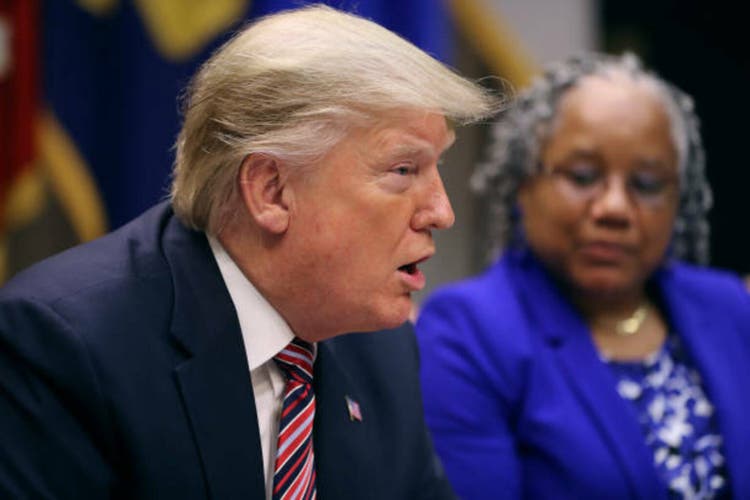Business
Trump’s Deregulation Fuels Multibillion-Dollar Boost for Detroit Automakers

The recent rollbacks of electric vehicle (EV) incentives and emissions regulations by President Donald Trump are significantly altering the landscape of the U.S. auto industry. This shift is projected to free up billions of dollars for major Detroit automakers, specifically General Motors and Ford Motor Company, allowing them to reinvest heavily in gasoline-powered vehicles.
According to a report by Bloomberg News on March 24, 2024, the new regulatory environment may enable these companies to redirect funds previously allocated for compliance with stricter emissions standards. With these changes, the focus will likely shift back to traditional combustion engines, which have been the cornerstone of the automotive industry for decades.
This development comes at a crucial time for Detroit’s automakers. As the industry grapples with the increasing demand for EVs and the complexities of transitioning to sustainable energy sources, the rollback of these regulations presents both opportunities and challenges. The financial relief provided by the deregulation could result in a substantial boost to production capacities and marketing efforts for gasoline-powered models.
Many analysts believe that this strategic pivot could lead to a renewed focus on consumer preferences for SUVs and trucks, which have dominated vehicle sales in the U.S. market. According to industry data, these segments have shown resilience, particularly in regions where fuel prices remain comparatively low. Such a shift might also allow automakers to maintain profitability amidst the ongoing economic fluctuations.
Furthermore, the environmental implications of this policy change are significant. Critics argue that rolling back emissions standards could hinder progress toward reducing greenhouse gas emissions, potentially impacting climate change efforts. The U.S. Environmental Protection Agency has voiced concerns that such a move might lead to increased pollution levels, a point of contention among environmental advocates and policymakers.
In light of these changes, both General Motors and Ford have signaled their intentions to capitalize on the newfound financial flexibility. With plans to expand their lineups of gasoline-powered vehicles, they aim to cater to consumers who remain skeptical about fully transitioning to electric models. The two companies are expected to announce new investments in manufacturing facilities in the coming months to support this strategy.
As the auto industry continues to evolve, the ramifications of these regulatory changes will likely unfold in various forms. The balance between profitability and environmental responsibility remains a central issue for automakers. The decisions made now will not only shape the future of the U.S. auto industry but also influence global trends in automotive manufacturing and sustainability.
This situation underscores the complex interplay between economic incentives and environmental considerations in the automotive sector. Observers will be closely monitoring how Detroit’s automakers navigate this new regulatory landscape and what it means for their long-term strategies in a rapidly changing market.
-

 Lifestyle1 week ago
Lifestyle1 week agoWinnipeg Celebrates Culinary Creativity During Le Burger Week 2025
-

 Science3 weeks ago
Science3 weeks agoMicrosoft Confirms U.S. Law Overrules Canadian Data Sovereignty
-

 Education2 weeks ago
Education2 weeks agoRed River College Launches New Programs to Address Industry Needs
-

 Technology3 weeks ago
Technology3 weeks agoDragon Ball: Sparking! Zero Launching on Switch and Switch 2 This November
-

 Science3 weeks ago
Science3 weeks agoTech Innovator Amandipp Singh Transforms Hiring for Disabled
-

 Technology3 weeks ago
Technology3 weeks agoWorld of Warcraft Players Buzz Over 19-Quest Bee Challenge
-

 Technology3 weeks ago
Technology3 weeks agoGoogle Pixel 10 Pro Fold Specs Unveiled Ahead of Launch
-

 Science3 weeks ago
Science3 weeks agoChina’s Wukong Spacesuit Sets New Standard for AI in Space
-

 Science3 weeks ago
Science3 weeks agoXi Labs Innovates with New AI Operating System Set for 2025 Launch
-

 Technology3 weeks ago
Technology3 weeks agoNew IDR01 Smart Ring Offers Advanced Sports Tracking for $169
-

 Technology3 weeks ago
Technology3 weeks agoGlobal Launch of Ragnarok M: Classic Set for September 3, 2025
-

 Technology3 weeks ago
Technology3 weeks agoFuture Entertainment Launches DDoD with Gameplay Trailer Showcase
-

 Technology3 weeks ago
Technology3 weeks agoHumanoid Robots Compete in Hilarious Debut Games in Beijing
-

 Technology3 weeks ago
Technology3 weeks agoInnovative 140W GaN Travel Adapter Combines Power and Convenience
-

 Business3 weeks ago
Business3 weeks agoNew Estimates Reveal ChatGPT-5 Energy Use Could Soar
-

 Science3 weeks ago
Science3 weeks agoNew Precision Approach to Treating Depression Tailors Care to Patients
-

 Health3 weeks ago
Health3 weeks agoGiant Boba and Unique Treats Take Center Stage at Ottawa’s Newest Bubble Tea Shop
-

 Technology3 weeks ago
Technology3 weeks agoQuoted Tech Launches Back-to-School Discounts on PCs
-

 Technology3 weeks ago
Technology3 weeks agoBorderlands 4 Promises Massive Changes with 30 Billion Guns
-

 Technology3 weeks ago
Technology3 weeks agoDiscover the Relaxing Charm of Tiny Bookshop: A Cozy Gaming Escape
-

 Science3 weeks ago
Science3 weeks agoNew Study Reveals Surprising Impact of Gratitude on Helping Behaviors
-

 Lifestyle3 weeks ago
Lifestyle3 weeks agoVancouver’s Mini Mini Market Showcases Young Creatives
-

 Education2 weeks ago
Education2 weeks agoAlberta Teachers’ Strike: Potential Impacts on Students and Families
-

 Science3 weeks ago
Science3 weeks agoInfrastructure Overhaul Drives AI Integration at JPMorgan Chase










